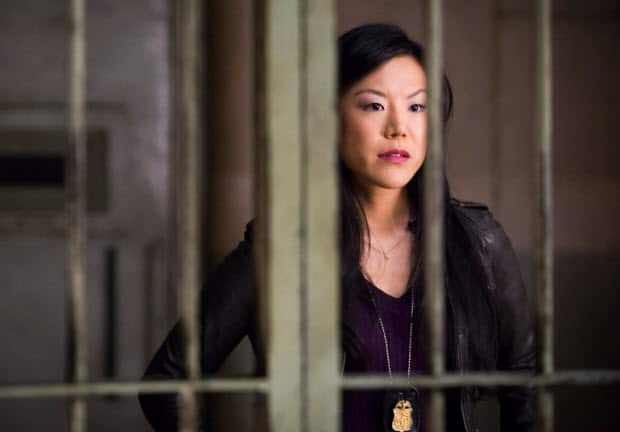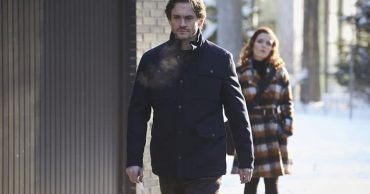
What makes a cliffhanger work and what makes a cliffhanger fall flat? Find out in next week’s review.
“Takiawase,” which falls into the category of killer-of-the-week episode, is fully immersed in the history of Hannibal the series as Will has to plunge himself further into his recent past to recover what Dr. Lecter has taken from him. The episode begins with another instance of Will fishing for his memories, this time accompanied by Abigail Hobbs (welcome back, Kacey Rohl; we’re glad you still have your ears). The idea of Will as a father to Abigail is brought up again and overtly, but rather than it feeling like an annoying retelling of themes that have been hammered home already, it allows another entry point into delineating what kinds of characters are what types of people. There are hunters and there are fishers. They’re the same things to Abigail, who says that in “one you stalk, the other you lure.” “One you catch, the other you shoot” is Will’s retort. Will is, of course, the classic fisherman. It is his job to catch, though he’s been the hunter before in taking down Abigail’s father. But his is a more lure-like approach. For anyone who has read or seen the adaptations of Red Dragon, you will recall Will Graham acting as bait for the Tooth Fairy. This is his process. This is his design. Hannibal Lecter is much more the stalker and, thus, the hunter–when he needs to be (as in his incomplete attempt to kill Dr. Du Maurier). In a series that is constantly putting its two leads side-by-side to compare, this is yet another key difference in who Will and Hannibal are, especially since both are capable of crossing over into the opposing category despite their natures.
Oh, wait, were you hoping to read something about cliffhangers? Good. Both the cliffhanger of “Takiawase” and the flash-forward cold open of the season premiere are television storytelling tropes that can just as often frustrate as they can impress. Part of what factors into a cliffhanger is the knowledge that viewers possess and the logical projections they can make given that knowledge. The cliffhanger in “Takiawase,” I would argue, is not really a cliffhanger in the traditional sense, because there isn’t a question of what’s going to happen. Beverly Katz is going to die. There’s no way of keeping her alive and having this season progress, and the visual storytelling of the scene–the bullet going through the roof, indicating Hannibal must have grabbed her firing arm and pushed it upward–suggests as much. But does that make it an ineffective way of ending the episode if we know what’s going to happen? My two cents there is that scene still works as a tense action piece that you might find in a more traditional horror story. By that standard, the fact that we don’t see the conclusion to the confrontation doesn’t matter. It is executed well and in a subtle way that Hannibal is so often apathetic to. We’ve seen horrific displays of violence and gore, but not turning the camera to whatever Bev is looking at makes that horror all the more menacing in our minds.
“Horror” is actually mentioned by name in the script when Hannibal is speaking with Bella. “I’ve always found the idea of death comforting. The thought that my life could end at any moment frees me to fully appreciate the beauty and art and horror of everything this world has to offer.” Though we’ve heard some of Hannibal’s worldviews expressed as cleanly as this before, we’re much more trained to pay attention to them now based on who Hannibal is speaking to and if there might be an indication that he’s fabricating something. This seems genuine, and for that it is incredibly interesting when applied to the man speaking it. Hannibal has an incredibly keen sense of self-preservation, as if his body involuntarily kicks into that mode whenever he’s threatened of being exposed. It’s never felt like a total acceptance to where he would just let a fate like that take him without a fight. Yet, what he says about that comfort altering his perception of the world makes total sense and falls in line with his conversation with the Muralist from a couple episodes back. Beauty, art and horror are all naturally occurring things in the world, and Hannibal believes in and recognizes the importance of them. Often, a poet will have to train himself to be more perceptive of his surroundings to induce inspiration (which is somewhat of an oxymoron, but that’s how it goes). Hannibal Lecter has, over many years, trained himself to see things in the same way–to see all of what is there in all its hideousness and beauty. These conversations have become so much more than vehicles for great actors to put in great performances. All of Fuller’s scrips (Fuller is credited as co-writer for this one) are full of rich ideas worth unpacking, even if they sometimes verge on the pretentious or cliche.
However, these scenes still are those vehicles, and Gina Torres returns to absolutely kill every second she is on the screen. From the calculated shift in tone and body language when she tells Jack she’s added a DNR (do not resuscitate) to her file to her near-suicide in front of Hannibal to her slapping the doctor for denying her her preferred exit and goodbye, this is a superb guest turn from a character who feels fully realized and an integral part of this story. It helps, of course, that the “serial killer” plot is completely connected to Bella’s story, since both revolve around easing someone’s pain and letting them die in some skewed form of happiness. But Bella carries the material all on her own as one of the strongest characters in “Takiawase.” With a conflict like this, it’s difficult to feel strongly about either side, since both Bella and Jack have perspectives that are understandable and respectable. Instead, what’s more interesting to me is how strongly Fuller is bringing Hannibal and Jack together. By resuscitating Bella, Hannibal’s earned a massive amount of points from Jack, even though we don’t see that scene (hopefully, we will next week). Now, that twelve weeks later fight seems so distant as to almost be out of sight. The other aspect of the Bella suicide attempt that intrigues is Hannibal flipping his coin she brings to thank him for his Socrates lesson. What would have happened if the coin landed on the other side? Did anyone else think Hannibal was possibly going to remove something from Bella given how he pointed out how strong she was? Hannibal hardly acts like someone who is interested in chance or luck, but it did play out a lot like an Anton Chigurh scene from No Country for Old Men. And as beautiful as the whole sequence was, I’m a little miffed that the commercial break that interrupts it is a cheap way of making the audience think Bella is dead and care about that, then bringing her back to life.
That said, pretty much every aspect of “Takiawase” worked in the same flawless way that Hannibal does its thing. The honey harvester (I don’t know what we’re calling her, so dumb alliteration suits me) isn’t exactly an especially interesting and deep character, but as I mentioned earlier, the ideas behind her actions are absolutely essential in grounding the episode via an overarching theme. Amanda Plummer, the actress, is also the perfect amount of crazy and creepy in the role, which is all anyone can ask for, really. Now, I always want to see Hannibal have conversations with everyone else that the FBI is investigating just to see his interpretation of their actions, but sitting Jack, Brian and Jimmy in that room with her was good enough (on top of some more dark humor from the forensics team).
In the grand scheme of things, Beverly’s death is probably the beginning of that ticking time bomb. There’s no good way of covering it up now that Hannibal knows she had been working with Will. That means any convenient way Hannibal could stage her death won’t overcome the rightful belief that she was getting too close to the truth. The strange part there, and getting back to the initial idea of hunters and fishers, is that Hannibal seems to guide Beverly into that room in his house. He blatantly states what she needs to do to uncover the truth (look more closely, essentially) as if to lure her in for the catch. This, unlike some of his other actions in these early second season episodes, feels less like a mistake due to pride and smugness and more of an intelligent move to prevent him from losing this game. How that applies to other characters like Dr. Chilton, though, is uncertain if Fuller is staying close to the source material, of which Chilton is a part after the events taking place in this season. Will is doing a fine job of manipulating Chilton by playing into his vanity, so any future scenes with Chilton and Hannibal are sure to be some form of exciting. A final nod of approval goes out to the brief return of Eddie Izzard as Dr. Abel Gideon, who joins the other returning guest stars to round out a great cast for this episode. Until next week.
[Photo via Brooke Palmer/NBC]
 Follow Us
Follow Us






Awesome review, I think you picked up on a lot of aspects of the episode that a lot of other reviewers seem to have missed! Takiawase was just so well-done on nearly every level and it’s probably going to serve as a fantastic lead-in to the next episode, which I hear is going to be insane (in a very good way).
Thank you, ponpon. Yeah, when you say “on nearly every level,” I realize I completely forgot to write about some of the interesting direction that Semel does in this episode, like following the bee in the beginning, the Requiem for a Dream-like scene when Will allows Chilton to test him and the blurred shot of Hannibal as Bella is slipping away. Very much looking forward to seeing how the season is supposed to take off from here.
Definitely one of the best shows on TV.